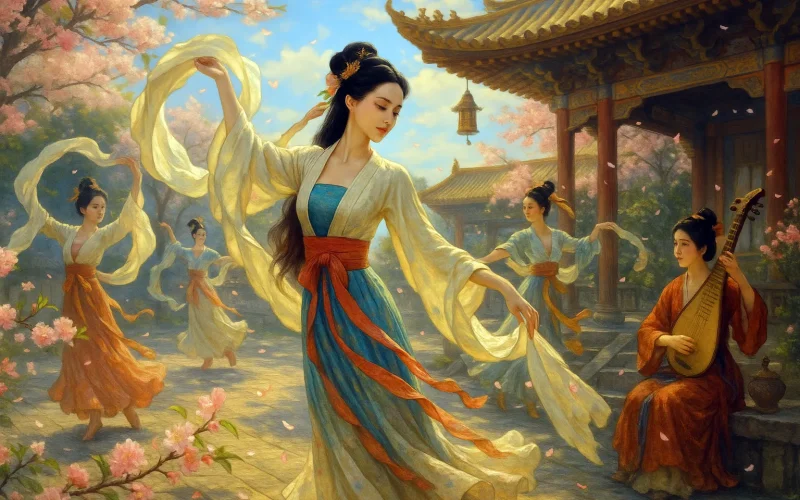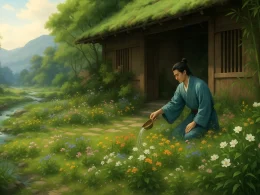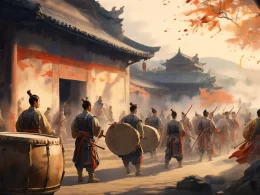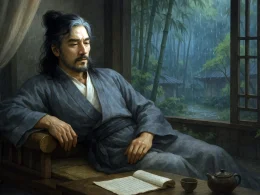In Han and Wei, many held strange and noble pride,
Unconventional, they left fame and wealth aside.
They took pride in keeping promises they'd own,
Each harboring ambitions to overthrow the throne.
To make a friend, they valued a single word so deep,
To meet a pledge, a thousand miles they'd leap.
Their dark-stained bows gleam under the moon's light,
Gold-reined steeds gallop as floating clouds in flight.
Some played flutes in Wu's market, free and loud,
Some struck zithers in Yan's streets, a fearless crowd.
Like Marquis of Bowang who sought the river's source,
They roamed to find brave friends on their course.
A young man with but one glance could command,
Driving northward, leaving Longtou's land.
Their halberds shimmer like frost in the air,
Swords gleam with rainbows, beyond compare.
Tianshan's snows, both winter and summer, lie,
Jiaohe's waters north and south flow by.
When clouds loom dark o'er Dragon Sands' terrain,
Leaves fall at Wild Goose Gate, autumn's reign.
They'd risk their lives for friends who understand,
Not for their own gain, but for a righteous stand.
Original Poem
「结客少年场行」
虞世南
韩魏多奇节,倜傥遗声利。
共矜然诺心,各负纵横志。
结交一言重,相期千里至。
绿沉明月弦,金络浮云辔。
吹箫入吴市,击筑游燕肆。
寻源博望侯,结客远相求。
少年怀一顾,长驱背陇头。
焰焰戈霜动,耿耿剑虹浮。
天山冬夏雪,交河南北流。
云起龙沙暗,木落雁门秋。
轻生殉知己,非是为身谋。
Interpretation
Yu Shinan lived a life of quiet integrity and purity, yet he was not detached from the world. He inherited the legacy of the Six Dynasties' literary style while also drawing nourishment from the early Tang atmosphere, experimenting with diverse themes. This poem draws upon the old Yuefu title "Song of the Youthful Gallants," which was traditionally used to express the spirit of chivalry and the demeanor of wandering heroes. In this work, Yu Shinan does not merely imitate his predecessors; instead, he uses refined language to shape a heroic and imposing group image of gallants, highlighting at the end their spirit of valuing loyalty over life and sacrificing themselves for kindred spirits, infusing the entire poem with a strong sense of moral integrity.
First Couplet: "韩魏多奇节,倜傥遗声利。"
Hán Wèi duō qí jié, tìtǎng yí shēng lì.
Han and Wei produced many men of extraordinary integrity;
Unconstrained, they left behind fame and profit.
This establishes the origin of the gallant spirit. Han and Wei were states during the Warring States period known for producing chivalrous heroes. The poet admires their "extraordinary integrity" (奇节 qí jié), which lay in their disregard for personal safety in favor of righteousness and their indifference to wealth and status, setting the tone from the very beginning.
Second Couplet: "共矜然诺心,各负纵横志。"
Gòng jīn rán nuò xīn, gè fù zònghéng zhì.
Together they cherished a heart true to its word;
Each embraced ambitions to roam the world.
The gallant spirit lies in "keeping promises" (然诺 rán nuò)—meaning what one says and following through—and in "roaming the world" (纵横 zònghéng)—aspiring to travel widely and achieve great deeds. This is a condensed portrayal of the character and ambitions of these heroes.
Third Couplet: "结交一言重,相期千里至。"
Jiéjiāo yī yán zhòng, xiāng qī qiānlǐ zhì.
In friendship, a single word carries great weight;
When summoned, they journey a thousand miles without fail.
This depicts the gallants’ trustworthy nature: when called by friends, they would travel great distances to fulfill their commitments, reflecting their deep commitment to loyalty.
Fourth Couplet: "绿沉明月弦,金络浮云辔。"
Lǜ chén míngyuè xián, jīn luò fúyún pèi.
Green-polished bows gleam like moonlight;
Golden bridles shine like floating clouds.
This captures the gallants’ external demeanor: armed with bows and riding horses adorned with gleaming tack, they cut a magnificent and dashing figure, full of heroic spirit.
Fifth Couplet: "吹箫入吴市,击筑游燕肆。"
Chuīxiāo rù Wú shì, jī zhú yóu Yàn sì.
Some played flutes in the markets of Wu;
Others played the zhu in the streets of Yan.
These lines allude to historical figures: Wu Zixu, who sought refuge in Wu, and Gao Jianli and Jing Ke, who played the zhu (a stringed instrument) in Yan. These references highlight how gallants endured hardships without compromising their integrity, revealing their resilience and readiness for greater missions.
Sixth Couplet: "寻源博望侯,结客远相求。"
Xún yuán Bówàng hóu, jié kè yuǎn xiāng qiú.
They traced the path of Marquis Bowang,
Seeking companions from afar.
The allusion to Zhang Qian (Marquis Bowang), who journeyed to the Western Regions, shows that the gallants were not limited to local adventures but aimed to contribute to the nation.
Seventh Couplet: "少年怀一顾,长驱背陇头。"
Shàonián huái yī gù, chángqū bèi lǒng tóu.
In youth, inspired by a single glance of recognition,
They rode far, leaving Longtou behind.
This emphasizes the ideal of "dying for one who recognizes your worth." Young gallants would venture without hesitation for the sake of a kindred spirit.
Eighth Couplet: "焰焰戈霜动,耿耿剑虹浮。"
Yànyàn gē shuāng dòng, gěnggěng jiàn hóng fú.
Gleaming halberds shimmer like frost;
Swords glow with a rainbow’s light.
Dynamic and static imagery combine to highlight the formidable weapons, symbolizing the gallants’ resolute courage as they march to battle.
Ninth Couplet: "天山冬夏雪,交河南北流。"
Tiānshān dōngxià xuě, Jiāo hé nánběi liú.
Tianshan’s snows linger through winter and summer;
The Jiao River flows north and south.
The majestic natural scenery underscores the vastness of the gallants’ journeys and their expansive spirit.
Tenth Couplet: "云起龙沙暗,木落雁门秋。"
Yún qǐ lóngshā àn, mù luò Yànmén qiū.
Clouds gather, darkening the desert sands;
Leaves fall, autumn reaches Yanmen Pass.
The bleak frontier scenery accentuates the gallants’ bravery and willingness to face hardship and danger.
Eleventh Couplet: "轻生殉知己,非是为身谋。"
Qīngshēng xùn zhījǐ, fēi shì wèi shēn móu.
They risk their lives for those who understand them,
Not for personal gain.
This is the core message of the poem. The "extraordinary" nature of the gallant spirit lies in valuing loyalty above life, facing death with courage, and transcending personal fame and fortune.
Holistic Appreciation
This poem portrays a group of gallants with heroic momentum and elegant refinement. It begins with "Han and Wei produced many men of extraordinary integrity" to trace the origin of the gallant spirit, then depicts their ambitions, actions, and demeanor: radiant on horseback, roaming freely, enduring hardships without losing integrity, or journeying to frontiers with lofty goals. The allusions to figures like Wu Zixu, Jing Ke, Gao Jianli, and Zhang Qian combine the spirit of chivalry with loyalty and patriotism. The concluding line, "They risk their lives for those who understand them, not for personal gain," clarifies the core of the gallant spirit—dying for a recognized worth, where righteousness outweighs life. The poem flows with vitality, blending vast frontier scenery with fresh and elegant charm, demonstrating Yu Shinan’s superb artistic skill.
Artistic Merits
- Lofty thematic conception: Using the gallant spirit as its theme, it rises above mere street chivalry to explore the realm of loyalty and patriotic service.
- Integration of allusions: References to Wu Zixu, Jing Ke, Gao Jianli, and Zhang Qian are naturally woven in, adding historical depth.
- Dynamic and static interplay: The movement of bows, horses, and weapons contrasts with the stillness of Tianshan and Yanmen, creating a expansive poetic atmosphere.
- Smooth flow of energy: From the gallants of Han and Wei, to market allusions, and then to frontier scenes, the poem progresses layer by layer, culminating in its thematic ascent to a higher plane.
- Vigorous yet refined language: The heroic grandeur of "gleaming halberds" and "glowing swords" is balanced by the elegance of "moonlight" and "floating clouds," combining boldness with literary grace.
Insights
This poem reflects the early Tang scholars’ ideal of chivalry: valuing loyalty over life, facing death courageously, all for reasons beyond personal gain. It reminds us that true value lies not in personal fame but in keeping faith, prioritizing righteousness, and undertaking responsibility for kindred spirits and greater justice. Even in adversity, one should uphold lofty ambitions to leave an enduring legacy in history and in human hearts.
About the Poet
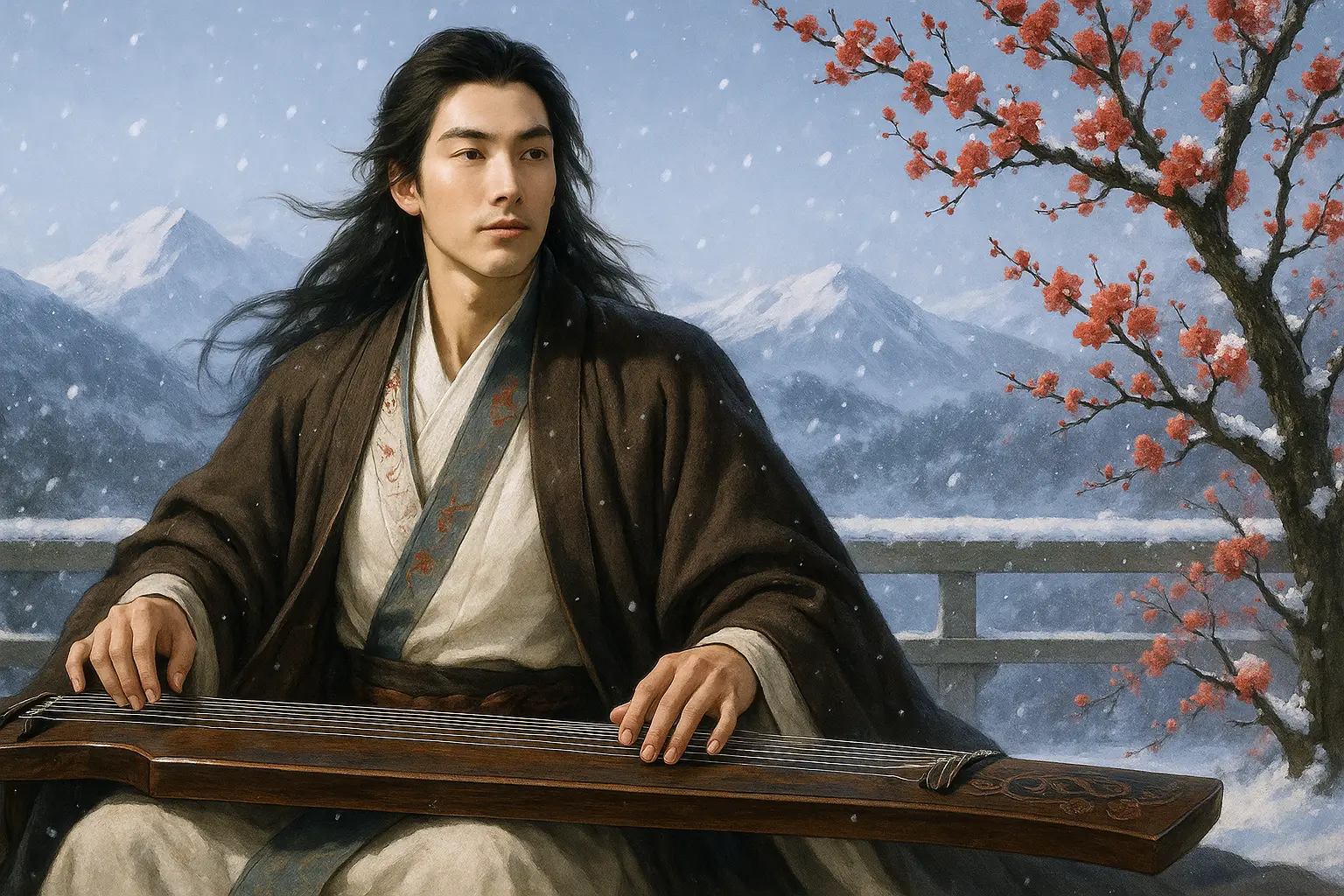
Yu Shinan (虞世南 558 - 638), a native of Yuyao in Zhejiang Province, was a prominent statesman, writer, calligrapher, and politician during the Zhenguan era of the early Tang dynasty. As one of the "Twenty-Four Meritorious Officials of Lingyan Pavilion," he rose to the position of Director of the Imperial Library. His calligraphy earned him a place among the "Four Great Calligraphers of the Early Tang," alongside Ouyang Xun, Chu Suiliang, and Xue Ji. In poetry, he inherited the tradition of Xu Ling and pioneered a refined, balanced, and harmonious courtly style. He also compiled the North Hall Book Excerpts, establishing a new genre of encyclopedic literature.







